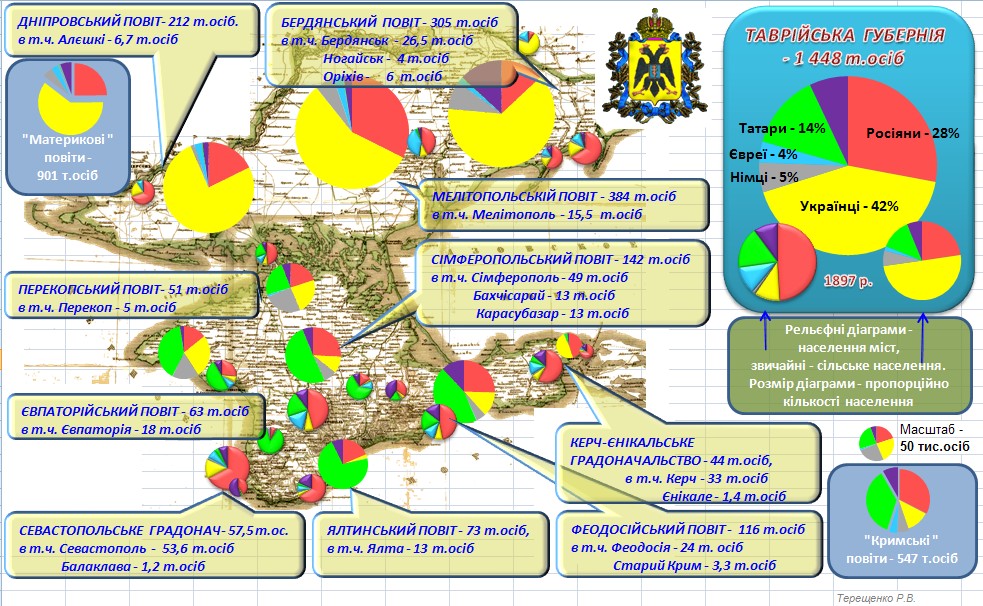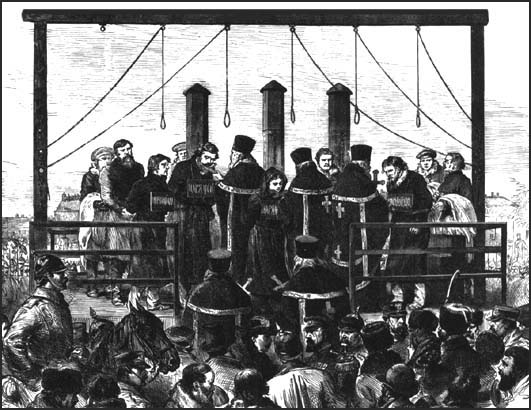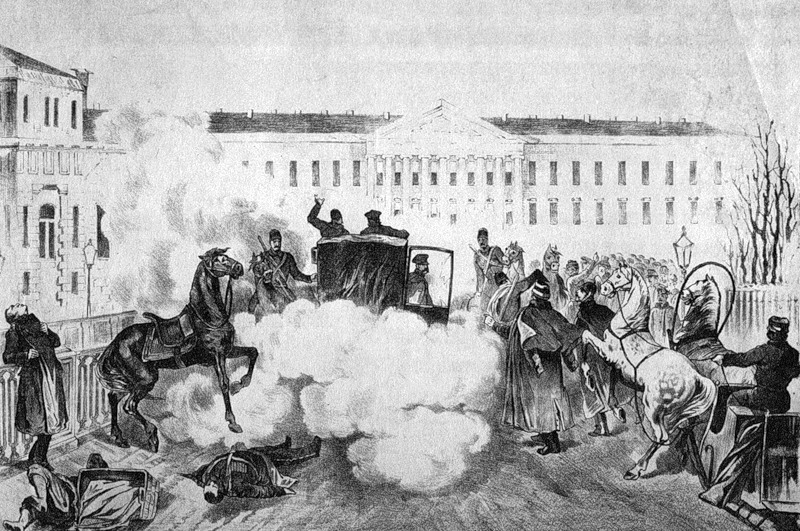|
Andrei Zhelyabov
Andrei Ivanovich Zhelyabov (russian: Желябов, Андрей Иванович; – ) was a Russian Empire revolutionary and member of the Executive Committee of Narodnaya Volya. After graduating from a gymnasium in Kerch in 1869, Zhelyabov got into a Law School of the Novorossiysky University in Odessa. He was expelled from the university for his participation in student unrests in October 1871 and sent away from Odessa. In 1873, Zhelyabov lived in a town of Gorodische (present-day Cherkas'ka oblast' of Ukraine) and maintained close ties with revolutionaries from Kiev and activists of the Ukrainian "Gromada". After his return to Odessa, Zhelyabov became a member of the revolutionary Felix Volkhovsky group (the Odessa affiliate of “ Chaikovtsi”) and conducted propaganda among workers and intelligentsia. He was arrested in late 1874 and then released on bail. Nevertheless, he continued his illegal activities. Zhelyabov was one of the suspects in the " Trial of the 193" ... [...More Info...] [...Related Items...] OR: [Wikipedia] [Google] [Baidu] |
Taurida Governorate
The Taurida Governorate (russian: Тавріическая губернія, modern spelling , ; crh, script=Latn, Tavrida guberniyası, ) or the Government of Taurida, was a historical governorate of the Russian Empire. It included the Crimean Peninsula and the mainland between the lower Dnieper River and the coasts of the Black Sea and Sea of Azov. It was formed after the Taurida Oblast was abolished in 1802 in the course of Paul I's administrative reform of the southwestern territories that had been annexed from the Crimean Khanate. The governorate's centre was the city of Simferopol. The province was named after the ancient Greek name of Crimea - Taurida. Today the territory of the governorate is part of the Crimea, Kherson, and Zaporizhzhia regions of Ukraine. Administrative divisions The governorate comprised three counties (uyezds) on the mainland: * Berdyansky Uyezd, centred in Berdyansk * Dneprovsky Uyezd, Oleshky * Melitopolsky Uyezd, Melitopol and five coun ... [...More Info...] [...Related Items...] OR: [Wikipedia] [Google] [Baidu] |
Propaganda
Propaganda is communication that is primarily used to influence or persuade an audience to further an agenda, which may not be objective and may be selectively presenting facts to encourage a particular synthesis or perception, or using loaded language to produce an emotional rather than a rational response to the information that is being presented. Propaganda can be found in news and journalism, government, advertising, entertainment, education, and activism and is often associated with material which is prepared by governments as part of war efforts, political campaigns, health campaigns, revolutionaries, big businesses, ultra-religious organizations, the media, and certain individuals such as soapboxers. In the 20th century, the English term ''propaganda'' was often associated with a manipulative approach, but historically, propaganda has been a neutral descriptive term of any material that promotes certain opinions or ideologies. Equivalent non-English terms have also l ... [...More Info...] [...Related Items...] OR: [Wikipedia] [Google] [Baidu] |
Pervomartovtsi
Pervomartovtsy (russian: Первома́ртовцы; a compound term literally meaning ''those of March 1'') were the Russian revolutionaries, members of ''Narodnaya Volya'', planners and executors of the assassination of Alexander II of Russia (March 1, 1881) and the attempted assassination of Alexander III of Russia (March 1, 1887, also known as "The Second First of March"). March 1, 1881 The assassination in 1881 was planned by Narodnaya Volya's Executive Committee. Andrei Zhelyabov was the main organizer. After his arrest on February 27, he was replaced by Sophia Perovskaya. Alexander II was killed on March 1, 1881 by a bomb, thrown by Ignacy Hryniewiecki. Hryniewiecki wounded himself fatally in the assassination; Nikolai Sablin committed suicide. Accomplices - Zhelyabov, Perovskaya, Nikolai Kibalchich, Hesya Helfman, Timofei Mikhailov, Nikolai Rysakov - were tried by the Special Tribunal of the Ruling Senate on March 26-29 and sentenced to death by ... [...More Info...] [...Related Items...] OR: [Wikipedia] [Google] [Baidu] |
Assassination Of Alexander II Of Russia
On 13 March ld_Style_and_New_Style_dates.html"_;"title="_March,_Old_Style_and_New_Style_dates">Old_Style_1881,_Alexander_II_of_Russia.html" ;"title="Old Style and New Style dates">Old Style">ld_Style_and_New_Style_dates.html" ;"title=" March, Old Style and New Style dates">Old Style 1881, Alexander II of Russia">Alexander II, the Emperor of Russia, was assassinated in Saint Petersburg, Russian Empire, Russia while returning to the Winter Palace from Mikhailovsky Manège in a closed carriage. The assassination was planned by the Executive Committee of '' Narodnaya Volya'' ("People's Will"), chiefly by Andrei Zhelyabov. Of the four assassins coordinated by Sophia Perovskaya, two of them actually committed the deed. One assassin, Nikolai Rysakov, threw a bomb which damaged the carriage, prompting the Tsar to disembark. At this point a second assassin, Ignacy Hryniewiecki, threw a bomb that fatally wounded Alexander II. Alexander II had previously survived several attempts on hi ... [...More Info...] [...Related Items...] OR: [Wikipedia] [Google] [Baidu] |
Voronezh
Voronezh ( rus, links=no, Воро́неж, p=vɐˈronʲɪʂ}) is a city and the administrative centre of Voronezh Oblast in southwestern Russia straddling the Voronezh River, located from where it flows into the Don River. The city sits on the Southeastern Railway, which connects western Russia with the Urals and Siberia, the Caucasus and Ukraine, and the M4 highway (Moscow–Voronezh– Rostov-on-Don– Novorossiysk). In recent years the city has experienced rapid population growth, rising in 2021 to 1,057,681, up from 889,680 recorded in the 2010 Census; making it the fourteenth most populous city in the country. Geography Urban layout Information about the original urban layout of Voronezh is contained in the "Patrol Book" of 1615. At that time, the city fortress was logged and located on the banks of the Voronezh River. In plan, it was an irregular quadrangle with a perimeter of about 130 fathoms (238 m), that is, it was very small: inside it, due to lack of sp ... [...More Info...] [...Related Items...] OR: [Wikipedia] [Google] [Baidu] |
Zemlya I Volya
Land and Liberty (russian: Земля и воля, Zemlya i volya Zemlia i volia; also sometimes translated Land and Freedom) was a Russian clandestine revolutionary organization in the period 1861–1864, and was re-established as a political party in the period 1876–1879. It was a central organ of the ''Narodnik'' movement. The first composition (1861-1864) The inspirers of the society were Alexander Herzen and Nikolay Chernyshevsky. The participants set as their goal the preparation of a peasant revolution, their policy documents created under the influence of the ideas of Herzen and Ogarev, the latter of which ho had coined the term "Land and Liberty" in one of his articles. The first Executive Committee of the organization included 6 of its organizers (Nikolai Obruchev, Sergey Rymarenko, the brothers Nikolai and Alexander Serno-Solovyevich, Alexander Sleptsov, Vasily Kurochkin). Land and Liberty was a union of circles located in 13-14 cities. The largest circles w ... [...More Info...] [...Related Items...] OR: [Wikipedia] [Google] [Baidu] |
Congress
A congress is a formal meeting of the representatives of different countries, constituent states, organizations, trade unions, political parties, or other groups. The term originated in Late Middle English to denote an encounter (meeting of adversaries) during battle, from the Latin '' congressus''. Political congresses International relations The following congresses were formal meetings of representatives of different nations: *The Congress of Aix-la-Chapelle (1668), which ended the War of Devolution *The Congress of Aix-la-Chapelle (1748), which ended the War of the Austrian Succession *The Congress of Aix-la-Chapelle (1818) *The Congress of Berlin (1878), which settled the Eastern Question after the Russo-Turkish War (1877–1878) *The Congress of Gniezno (1000) *The Congress of Laibach (1821) *The Congress of Panama, an 1826 meeting organized by Simón Bolívar *The Congress of Paris (1856), which ended the Crimean War *The Congress of Troppau (1820) *The Congre ... [...More Info...] [...Related Items...] OR: [Wikipedia] [Google] [Baidu] |
Lipetsk
Lipetsk ( rus, links=no, Липецк, p=ˈlʲipʲɪtsk), also romanized as Lipeck, is a city and the administrative center of Lipetsk Oblast, Russia, located on the banks of the Voronezh River in the Don basin, southeast of Moscow. Population: History Lipetsk was first mentioned in the 13th century chronicles. The name means " Linden city" and is cognate with Leipzig and Liepāja. In 1284, the city was destroyed by the Mongols. The foundation of the modern city dates back to 1703,Charter of Lipetsk, Article 1 when Peter the Great ordered construction of a cast iron factory in Lipetsk near the iron ore deposits for making artillery shells. On September 27, 1779, Lipetsk was granted town status. It became one of the principal towns of Tambov Governorate. In 1879, Lipetsk hosted a congress of members of Land and Liberty. After the Treaty of Rapallo (1922) until 1933, the much-reduced German Army (''Reichswehr'') of the Weimar Republic secretly contracted wi ... [...More Info...] [...Related Items...] OR: [Wikipedia] [Google] [Baidu] |
Terrorism
Terrorism, in its broadest sense, is the use of criminal violence to provoke a state of terror or fear, mostly with the intention to achieve political or religious aims. The term is used in this regard primarily to refer to intentional violence during peacetime or in the context of war against non-combatants (mostly civilians and neutral military personnel). The terms "terrorist" and "terrorism" originated during the French Revolution of the late 18th century but became widely used internationally and gained worldwide attention in the 1970s during the Troubles in Northern Ireland, the Basque conflict, and the Israeli–Palestinian conflict. The increased use of suicide attacks from the 1980s onwards was typified by the 2001 September 11 attacks in the United States. There are various different definitions of terrorism, with no universal agreement about it. Terrorism is a charged term. It is often used with the connotation of something that is "morally wrong". Governments ... [...More Info...] [...Related Items...] OR: [Wikipedia] [Google] [Baidu] |
Peasantry
A peasant is a pre-industrial agricultural laborer or a farmer with limited land-ownership, especially one living in the Middle Ages under feudalism and paying rent, tax, fees, or services to a landlord. In Europe, three classes of peasants existed: slave, serf, and free tenant. Peasants might hold title to land either in fee simple or by any of several forms of land tenure, among them socage, quit-rent, leasehold, and copyhold. In some contexts, "peasant" has a pejorative meaning, even when referring to farm laborers. As early as in 13th-century Germany, the concept of "peasant" could imply "rustic" as well as "robber", as the English term villain/villein. In 21st-century English, the word "peasant" can mean "an ignorant, rude, or unsophisticated person". The word rose to renewed popularity in the 1940s–1960s as a collective term, often referring to rural populations of developing countries in general, as the "semantic successor to 'native', incorporating all its conde ... [...More Info...] [...Related Items...] OR: [Wikipedia] [Google] [Baidu] |
Podolsk
Podolsk ( rus, Подольск, p=pɐˈdolʲsk) is an industrial city, center of Podolsk Urban Okrug, Moscow Oblast, Russia, located on the Pakhra River (a tributary of the Moskva River). History The first mentions of the village of Podol, which belonged to the votchina of the Danilov Monastery, are contained in the church letopis of 1627-1628. On October 5, 1781, by the personal decree of Catherine II, the Podolsky Uyezd was formed, and the village of Podol was renamed the city of Podolsk. Podolsk land is directly connected with the events of the Patriotic War of 1812. After the Battle of Borodino, the troops under the leadership of Mikhail Kutuzov, passing through Podolsk, took up defensive positions near the village of Krasnaya Pakhra, Podolsk district, then approached Tarutino, setting up a camp here. The famous Tarutino maneuver determined the entire further victorious course of the war with the Napoleonic army. After the Patriotic War of 1812, Podolsk and P ... [...More Info...] [...Related Items...] OR: [Wikipedia] [Google] [Baidu] |
Acquittal
In common law jurisdictions, an acquittal certifies that the accused is free from the charge of an offense, as far as criminal law is concerned. The finality of an acquittal is dependent on the jurisdiction. In some countries, such as the United States, an acquittal operates to bar the retrial of the accused for the same offense, even if new evidence surfaces that further implicates the accused. The effect of an acquittal on criminal proceedings is the same whether it results from a jury verdict or results from the operation of some other rule that discharges the accused. In other countries, the prosecuting authority may appeal an acquittal similar to how a defendant may appeal a conviction. Scotland Scots law has two acquittal verdicts: ''not guilty'' and '' not proven''. However a verdict of "not proven" does not give rise to the double jeopardy rule. England and Wales In England and Wales, which share a common legal system, the Criminal Justice Act 2003 creates a ... [...More Info...] [...Related Items...] OR: [Wikipedia] [Google] [Baidu] |




.jpg)


